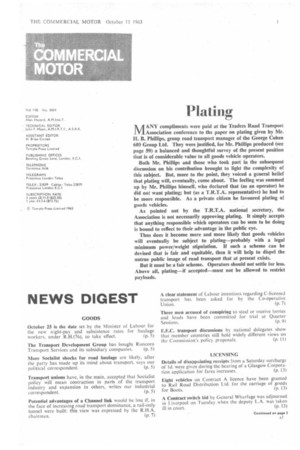Plating
Page 3

If you've noticed an error in this article please click here to report it so we can fix it.
MANY compliments were paid at the Traders Road Transport Association conference to the paper on plating given by Mr. H. B. Phillips, group road transport manager of the George Cohen 609 Group Ltd. They were justified, for Mr. Phillips produced (see page 59) a balanced and thoughtful survey of the present position that is of considerable value to all goods vehicle operators.
Both Mr. Phillips and those who took part in the subsequent discussion on his contribution brought to light the complexity of this subject. But, more to the point, they voiced a general belief that plating will, eventually, come about. The feeling was summed up by Mr. Phillips himself, who declared that (as an operator) he did not want plating; but (as a T.R.T.A. representative) he had to be more responsible. As a private citizen he favoured plating of goods vehicles.
As pointed out by the T.R.T.A. national secretary, the Association is not necessarily approving plating. It simply accepts that anything responsible which operators can be seen to be doing is bound to reflect to their advantage in the public eye.
Thus does it become more and more likely that goods vehicles will eventually be subject to plating—probably with a legal minimum power/weight stipulation. If such a scheme can be devised that is fair and equitable, then it will help to dispel the untrue public image of road transport that at present exists.
But it must be a fair scheme. Operators should not settle for less. Above all, plating—if accepted—must not be allowed to restrict payloads.




















































































































